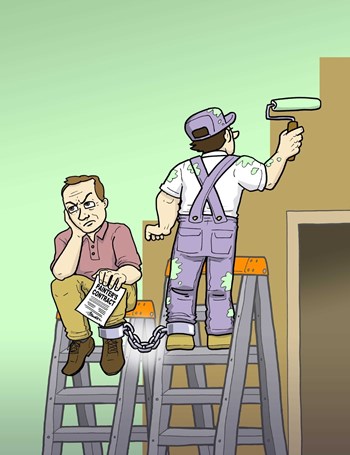
While the vast majority of one-time projects and long-term service contracts involving vendors and service providers and their condominium or HOA clients go smoothly and either conclude or continue without incident, a small percentage of jobs do jump the tracks in one way or another. Sometimes it’s a contractor’s inability to stay on schedule or stick to an agreed-upon budget that does it; sometimes it’s the quality of work itself that’s not up to par.
Whatever the cause, sometimes it’s necessary for condo administrators to pull the plug on a contract—and that sometimes can be easier said than done. But before any contracts are signed, experts agree that associations should make sure that all vendors and service providers are properly licensed and have a good record with the Better Business Bureau. Another useful search in Massachusetts, for example, would be the Clerk of Courts offices in each county to determine whether the contracting firm or its principals appear in litigation.
Breaking Ties
There are numerous reasons why a condominium manager or board might feel it necessary to break a contract with a vendor or service provider but some are more frequent than others.
“The most common reason is because the service provider, vendor or contractor is not performing in accordance with the terms and conditions of the contract,” say Mark Rosen, an attorney with law firm of Goodman, Shapiro & Lombardi in Dedham, Massachusetts. “It’s because they’re not providing the service or they’re not doing the job because it’s unsatisfactory to the homeowner of the association.”
“The typical reason is poor service or they are not satisfied with the performance of the contractor,” says Janet Aronson, an attorney with the Braintree, Massachusetts-based law firm of Marcus, Errico, Emmer & Brooks, P.C. “Any service contract could be a problem: laundry, landscaping and snow plowing. Truly, the contract itself governs the whole process of termination and the relationship between parties. The contract itself is very important.”
“If you are in breach you are then entitled to certain circumstances to terminate the contract but you don’t want to be in breach because that exposes you to a claim brought by the other party,” adds John E. Shaffer, an associate with MEEB. “Breaches mean that you are not fulfilling one or more of the material terms, it goes to the heart of the contract. It’s not a trivial thing. Basically, if they are providing services and they are not doing a good job and they are not doing the scope of services they signed on to do, that’s a material breach. For an owner, non-payment or not allowing access to the property, that would be a material breach. That would warrant termination. Anything that is material goes to the heart of the agreement of services provided.”
Writing the Contract
The association should decide what it wants to accomplish in a contract, and to be sure everything is included. In negotiating and writing a contract, an association board should rely on advice from its manager and management company, attorney, and design consultants—but the board makes the ultimate decision on the terms to which it will agree.
“The root of it all lies in the contract itself. Having the appropriate terms in the contract provides the board with protection, it actually protects both sides,” says Aronson. “What happens a lot is that an association gets a contract from a vendor, whether it’s snowplowing or landscaping, and they just sign it. Sometimes they don’t even sign a contract, they sign a proposal. The board should have their legal representative look over any contracts. If a long-term contract or an on-going contract, for a short amount of time they can have an attorney look it over for a few key provisions to make sure that the association has some protection. Lots of vendors will have automatic renewal provisions in their contracts, which we don’t recommend. They will also have unusual termination provisions where you would have to terminate within so many days prior to the expiration of the contract. Most professional management companies do have these and they do follow but boards change, management companies change and property managers within management companies change. Another provision that sometimes these contracts have is attorney’s fees for the contractor and nothing for the association. In other words, if there is a breach of contract or non-payment, then the vendor gets to recover their attorneys fees but the association doesn’t. We see that a lot.”
“The most important thing in a contract is specificity as to what the services are,” adds Rosen. “The basis for termination and withholding payment and how payment should be made on and what basis payment can be withheld. It’s essential to have very specific language as to how contractor vendors are to perform, services he or she is contracted to provide and specifically how the association can terminate the contract if the vendor fails to perform the services specified. You need objective criteria that can be substantiated and provided to the vendor after his failure to perform.”
Among the key issues a board should include in vendor contracts, says attorney Michael Merrill of Merrill & McGeary in Boston, are price, warranty, commencement date, completion date, additional costs (and how they are determined), and work rules. There are basic steps that an association can take, he suggests, to protect itself: “Good specs, bid the contract, have a good contract, do not pay too much in advance.”
And don’t forget about vetting the contractor. “Before you go into a contract, you should have worked with the contractor before or get references,” says Shaffer. “Trusting the contractor is the best contract, in my opinion. It’s always good to feel comfortable about it. So I would say don’t just look at the price, look at how qualified a person is and how dependable they are. All of these things are more important than saving a few dollars.”
“What I’m seeing more and more is associations will sign the proposal given to them by the vendor,” says Charles A. Perkins, Jr. Esq. of the law firm of Perkins & Anctil in Westford, Massachusetts. “And that proposal is awful in terms of the association and often has a liquidated damage provision that makes penalties if you get out of the contract and sometimes they have self-renewing provisions. “
Here are a few additional elements real estate experts believe that an association should seek to include when writing a contract:
• Termination for no cause, which could occur if the association board decides to get rid of a contractor it doesn’t like, if a new board or management company wants to replace the contractor with another it prefers, or if the board elects not to complete a project that is already underway. Then the association must pay the contractor for all costs and expenses he incurred prior to the termination.
• A default clause, which allows the association to cancel the contract if the contractor doesn’t cure a default within a specified time after notice by the association. The time to cancellation may be five, 10, or 30 days.
• A description of the work to be done, including a comprehensive scope of work statement, and a schedule of values containing a complete breakdown of quantities of materials and labor and their associated costs.
• A schedule that specifies three dates: when the work will begin, substantial completion, and final completion.
If Problems Arise
Shaffer believes that if a contract dispute develops, the board should first attempt to work things out with the contractor. “The first thing to do is try to work it out with the other side because you want to avoid things like lawyers fees and lawsuits and the risk that comes with that because there is no such thing as a slam dunk lawsuit,” he says. “It may be that the reason they are in breach is because they may be having internal problems and you can negotiate out of the contract. The two parties can agree to terminate the contract at no cost or whatever cost you agreed to.”
“Hopefully there is a good solid contract in place and if they do have one they will have the ability to terminate. They may or may not have the ability to withhold payment. It depends on what the terms of the contract are,” says Aronson. “What they should do is put the vendor on notice. If there is an issue with the contractor or service they should reach out to the vendor in writing to let them know that they are having these problems. It may be a communication problem. The key is having good contracts in play so that you have the ability to deal with the problem, if one arises.”
Rosen agrees with Aronson on the importance of documenting a breach of contract in writing.
“Allow for the vendor to cure the default,” Merrill agrees, “and if there’s no resolution, terminate.”
Most Contentious Contracts
Certain types of repairs and services — such as construction, roofing jobs, concrete restoration and replacement of windows — are prone to contract disputes, attorneys say.
“Contracts that have a continuing obligation are the ones that usually have the biggest problems, like snow plowing and landscaping,” Perkins concurs. “There are contracts that will have arbitration and mediation provisions in them. I don’t mind those provisions, but if you have a one-time construction contract and you have to go to mediation, you won’t be able to finish your mediation and contract at the same time. You just have to be very careful.”
George Leposky is a freelance writer and a frequent contributor to New England Condominium. Staff writer Christy Smith-Sloman contributed to this article.






Leave a Comment